15 Lessons On Mobile App Development From Top 100 Mobile Apps
Are you exploring the idea of building an app?
Below, I’ve outlined 15 important lessons we can learn about mobile app development from Top 100 Mobile Apps, to help when choosing an app developer, marketing strategy, app design, etc.
You have to learn the rules of the game. And then you have to play better than anyone else. – Albert Einstein
The following review looks at 15 lessons on mobile app development from top 100 mobile apps, what they are, why each one of them is unique and the lesson to learn.
Lesson #1 – Goal Oriented Design
Case Study – Tinder
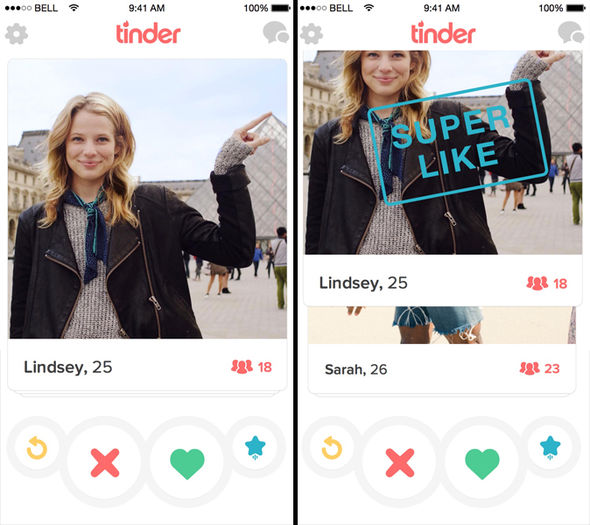
What it is:
Tinder has paved the way for modern ‘dating’. They’ve created a brand new way for people to connect with other people in their area.
Why it’s unique:
- Straight forward design – no diddelydoos or features for the sake of being.
- It’s a dating app with a shuffle card ‘feel’.
- The design appeals to both genders.
The lesson to learn:
Ensure your users’ goals are met quickly
Most companies that operate in the dating space match people with similar personalities through complex questionnaires, and other weird tests. All this stuff makes people feel awkward and none of it really helps them meet their objective very quickly.
Tinder on the other hand took a big side-step and started matching people at random who live in a similar area.
People can flip through profiles at a glance, without too much thinking or reading needed, and send connection requests to people that catch their interest.
Filling out questionnaires, or reading profiles takes away from the experience and maximises the work needed to achieve the desired outcome (see goal-directed design). Keep it clean, make it simple.
Lesson #2 – Avoid chasing short term gains
Case Study – Snapchat

What it is:
If you’re a non-millennial reading this, Snapchat involves a video, or photo snap is taken and sent to the receiver (most likely a friend…or sometimes an enemy). The receiver opens it and a timer is triggered. After the timer has timed-out the footage is erased forever. Just like that.
Why they’re unique:
In a ridiculously short space of time Snapchat has over 150million daily active users. The most successful update to Snapchat is the inclusion of ‘filters’ which they update daily, in order to create an anticipation for users that keep them coming back for more.
The fact that the content is automatically destroyed is the real hook of snapchat which has resulted in some pretty gnarly footage floating around in the ‘interwebs.’ Not to mention a 3 billion dollar acquisition offer from Facebook…which they casually denied.
The Lesson to learn:
Are you thinking big or fast?
In my experience, App entrepreneurs are primarily concerned with how to monetise.
Common strategies include charging $0.99 per download, or in app advertising. Even at the expense of turning the user off.
Putting yourself before your users may bring short term gains, however a ‘free-to-download-strategy’ removes a big barrier of entry and opens the doors to millions of people who normally wouldn’t pay for apps. As a result you’re almost certain to get more word-of-mouth-marketing… which solves your second problem… User Acquisition!
Ask yourself the question: Should I focus on Growth First and Revenue Later?
Lesson #3 – Does gamification equal user engagement?
Case Study – Lumosity
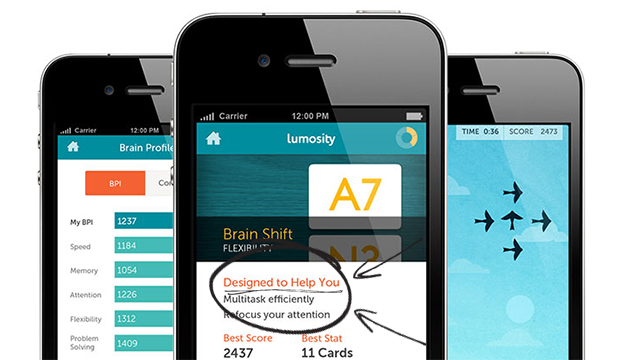
What it is:
Lumosity is super-cool online Brain Training Program that tracks your results and gives you visual feedback on how you’re training is going in terms of improvement of overall brain performance.
Why They’re Unique:
It uses gamification in a smart way to incentivise desired user behaviour. Using gamification they’ve managed to build an engaged user base of 40 million people around the globe and monetise through a monthly subscription model at $14 a month. How do I know? I’m one of the suckers paying the big bugs to train my brain!
The Lesson to Learn:
Nobody downloads an app JUST because it has gamification…
Use gamification…but use it in a smart way.
Foursquare uses a badge-reward-system to encourage good user behaviour. But users quickly grow tired of the app because they don’t have a strong enough reason to use it.
Lumosity’s training platform gives users a sense of achievement and reinforces it through gamification.
Check out our crash course on Gamifying Mobile Apps here.
Lesson #4 – Leapfrog existing players with mCommerce
Case Study – Jack Threads

What is it:
An online shopping club, featuring daily sales of top-tier street, skate, surf and contemporary men’s fashion brands, accessible via a stylish mobile app. (And yes I’m a regular user…)
Why They’re Unique:
Jack Threads were quick to jump aboard the ‘mCommerce-wagon’. It’s easy for users to browse their goods on the fly and because of their low-low prices and easy-to-use payment gateway it’s even easier to buy stuff.
The Lesson to Learn:
Get the First Mover Advantage
Back in 2008 competitive retailers like Amazon, etc. mopped up big turf by investing into the eCommerce scene before anyone else did. Why not take a leaf out of Jackthreads book, and leapfrog traditional competitors through mCommerce?
Lesson #5 – Dove-tail into successful applications
Case Study – VSCO Cam
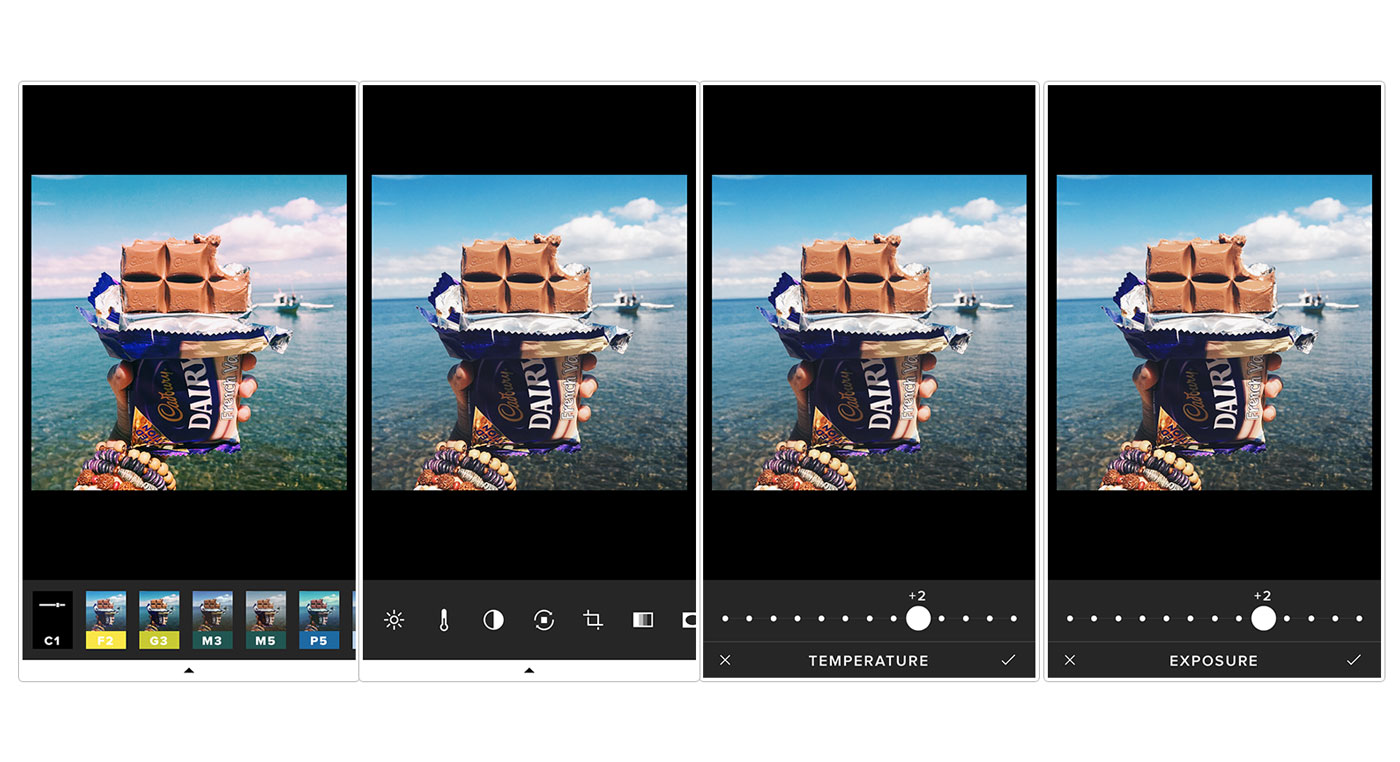
What it is:
The VSCO Cam app gives you extra filters, fonts, and colours for your Instagram photos. It’s a design favourite at our office.
Why They’re Unique:
They’ve leveraged the user-base of the popular app, Instagram, by adding value to the existing Instagramming process through additional filters and type-overlay, etc. VSCO isn’t the only (or even the first) to do this but they had a particular style that appealed to Instagram’s most dedicated audience.
The Lesson to Learn
Don’t reinvent the wheel
Are you struggling to come up with a the next big social network? Or Candy Crush Saga Game? You don’t need to reinvent the wheel. Why not just do what VSCO did and dove-tail off an already successful application?
What application can you Dove-tail off or add value to?
Lesson #6 – Generate Brand Awareness Through A Mobile App
Case Study – Lorna Jane
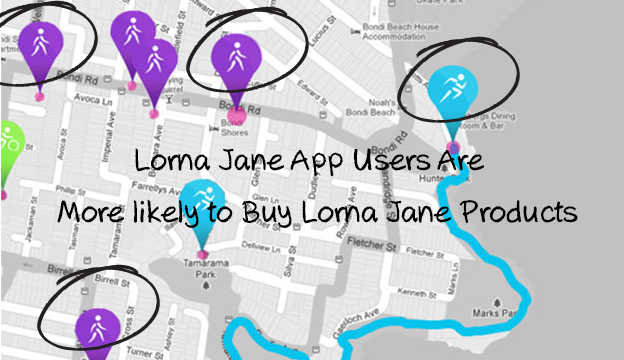
What it is:
Lorna Jane is a sports-brand clothing company and have launched a mobile app that tracks your exercise-runs, walks and cycles – similar to Nike+. You can record your distance traveled, total active time, pace, speed and calories burned. What exercise-junkie wouldn’t love this?
Why They’re Unique:
These guys are smart. They’re advertising in a non-intrusive way through a brand-building campaign which moulds the way consumers ‘feel’ about the company and products.
The Lesson to Learn
Advertise without annoying people
Simple question: Who do you think the user of the Lorna Jane app is going to buy their sports ware from next time – Who’s always in their face? It’s the ‘Recency & Frequency’ model gone mobile!
Lesson #7 – Innovate to Survive
Case Study – The Economist
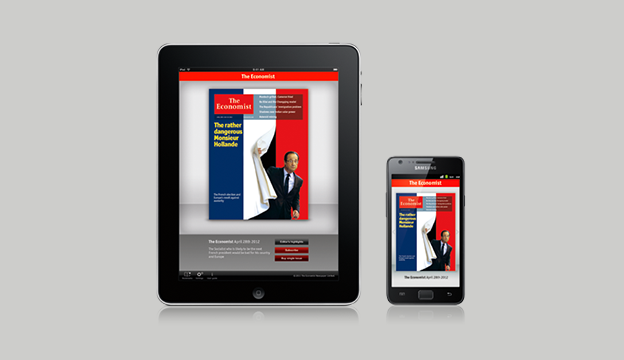
What it is:
The economist is a written publication and have led the way in print innovation, one of the first to market with digital version of their magazine to be downloaded as an application.
Why They’re Unique:
In response to the significant decline in printed media the smart marketing people at The Economist have engaged mobile app developers to help attract an even broader range of readers who prefer to read from an iPhone/iPad instead of print-media. Like me!
The Lesson to Learn
Stay with the bell-curve-of-change
Blockbuster, Taxi’s and other business who have enjoyed dominant market share for many years are now struggling to stay alive in this digital landscape.
If you’re in a market with emerging substitute products think about moving with the times (like The Economist), even if you’re not under threat…yet
The example above highlights how rapidly new technology can turn an industry on its head.
How will you avoid being left behind?
Lesson #8 – Use the Halo Effect to Generate Traction
Case Study – Uber Eats
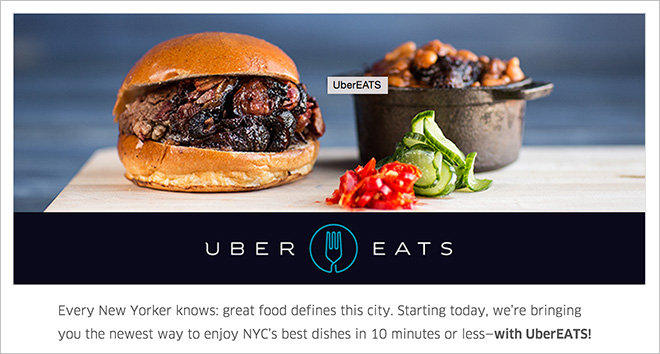
What is it:
UberEATS is an on-demand meal delivery service. Originally powered by the Uber ride sharing app it is now available as a stand alone app in its own right.
Why They’re Unique:
If you think of Uber as a ride-sharing platform, you’re wrong. Uber is dedicated to “finding better ways to move, work and thrive.” Once establishing themselves as a cutting edge and historically disruptive ride-sharing platform, they realised that the data collected by this platform opened up an entirely new suite of product opportunities.
The Lesson to Learn
Use past successes to your advantage
The halo effect is the concept of one product generating enthusiasm for another product by piggy-packing off the initial product’s reputation.
How could you do the same?
We were lucky enough to have Uber present at one of our innovation events, you can watch the insightful video presentation here.
Lesson #9 – Mirror your branding for a credibility boost
Case Study – CarSales.com.au
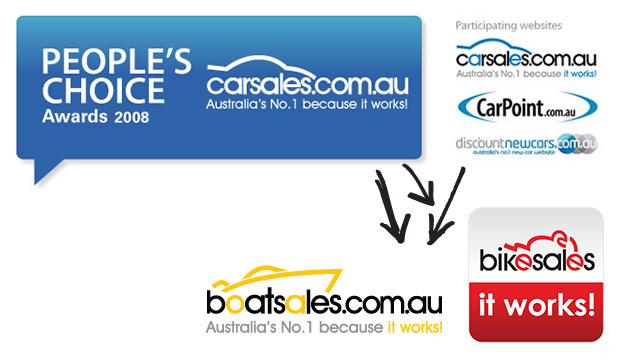
What is it:
CarSales.com.au is an uber successful open-to-public web platform used for buying/selling 2nd hand cars. Since launching, CarSales.com.au have extended their trading platforms to sell a range of different vehicles.
Why They’re Unique:
Carsales.com.au have a suite of apps. And have used their established success through branding and identity to gain quicker traction and credibility for their other platforms, Bikesales.com.au and Boatsales.com.au.
The Lesson to Learn
Leverage an existing brand
Carsales.com.au have leveraged their successful brand, and expanded into other vehicle product sales including bikes and boats. If you’’re already heavily invested in the marketing of your brand, why not use it to build credibility for new ventures?
Lesson #10 – Create your own platform architecture
Case Study – Flipboard
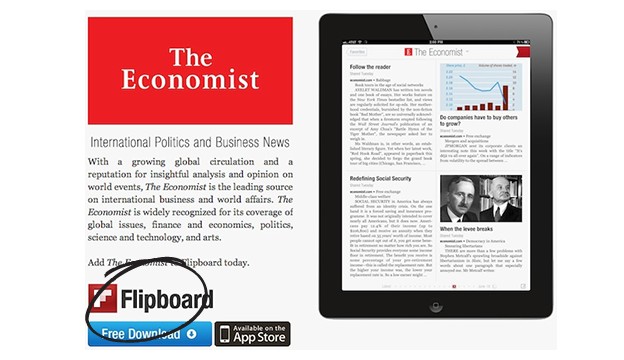
What it is:
Not focused on the Economist now, believe it or not. Steer your eyes down to the bottom left of the image above to see the ‘Flipboard’ logo. This smart company have created a platform for existing apps to be integrated within, allowing their users to save and share articles of interest.
Why They’re Unique
Through it’s smooth functionality and stunning app design Flipboarded is a medium of greater distribution for a number of apps that currently operate independently (like The Economist shown above).
The Lesson to Learn
Build a platform that others will become dependent on
By building a platform that businesses can use to get their content into the hands of more people you become the connecting medium between point A and point B. There is always value in being the middleman.
How can you leverage this strategy in your own industry?
Lesson #11 – Improve Existing Business Processes with an App
Case Study – Telstra 24X7 App

What is it
The Telstra 24X7 app allows you to manage all of your Telstra services in one place, including billing and usage details.
Why They’re Unique:
Not a totally unique concept but these guys have invested tens of thousands of dollars, probably more, into researching customer’s wants and needs and designing products to suit their needs. The result is that they’ve designed a completely new customer experience that revolutionised the way processes were currently being managed.
The Lesson to Learn
Use apps to improve business processes.
In the short period of time Telstra has been able to reduce expensive customer services hours and reduce paper waste whilst putting the experience in the hands of the customers.
How could you do the same?
For ideas on how to leverage mobile apps for your business check out this article titled 7 Ideas For Successfully Mobilising Your Business.
Lesson #12 – Don’t be everything for everyone
Case Study – Places I’ve Pooped

What it is
Places I’ve Pooped allows you to track and share with your friends, place you’ve pooped.
Why They’re Unique:
Whilst some would scoff at the thought of anyway spending any money on such a ridiculous app, boys around the globe have enjoyed many a laugh and a download.
Lesson to Learn:
Tap into a niche market
User Review: “My friends and I are having a competition for the most poops in the most places.”
PIP knew that it’s market was small, but the engagement and competition that it created was well worth the investment.
Are you working in a niche?
See also: How To Estimate Market Size For An App Idea
Lesson #13 – Do Something Really Different
Case Study – Yo Sperm Test
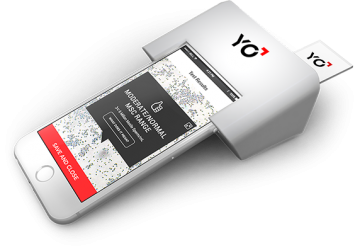
What it is:
Yo Sperm Test is the first FDA-approved test using a smartphone app to not only count sperm but see how well they swim.
Why They’re Unique:
The YO Sperm Test uses a three step process, using an app and a mini-microscope “clip” that goes on the top of your phone, allowing the device to access your phone’s light, focus and recording capabilities.
The first step is to prepare the sample on a slide, stick it into the clip, and in two minutes you’ll actually be able to see the moving sperm on your phone’s screen.
In another minute or so, the test results will be ready—and while you wait, the app provides some cheeky “sperm trivia” to lighten the mood. The video and results are then recorded in the app.
Lesson to Learn:
Be Unique and don’t be afraid to innovative using the latest technologies.
What can you do or offer that’s different?
Lesson #14 – Pay Attention to Detail
Case Study – Clash of Clans
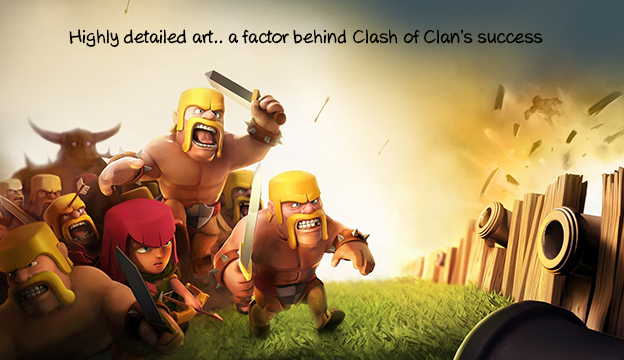
What it is:
Supercell’s Clash of Clans is one of the highest grossing apps of all time. It’s a combat strategy game that allows players to train troops and battle with other players online.
Why They’re Unique:
They’ve focused on creating an aesthetically beautiful environment. Something that sets them apart from their competitors. The artwork and gameplay pays careful attention to detail.
Lesson to Learn:
The details will set your game apart from the competition
Businesses can learn a tonne from a game like this – If you want to take your app to the next level, pay attention to the details. In turn, users will pay attention to you!
Lesson #15 – MVP (Minimum Viable Product)
Case Study – Shazaam
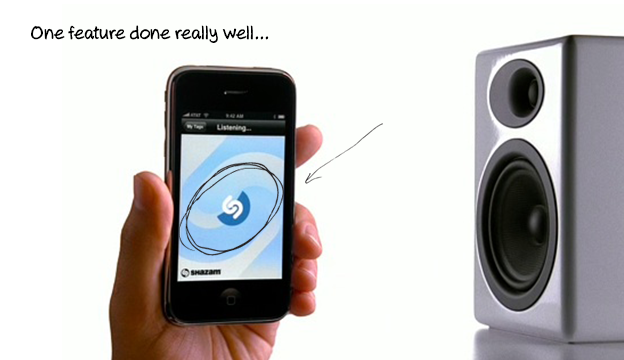
What it is:
Shazaam started as a dial-up service where the user would call a number, stick the receiver to the speaker and wait. After a while the voice on the other line would tell you what song it was…pre-iPhone days! Now days it’s a mobile application and works at the touch of a button.
Why They’re Unique:
Step#1: Choose one feature. Step #2: knock it out of the ballpark. Step #3: Go viral.
Lesson to Learn:
Do One Thing Really Well
In my experience, when developing a mobile app it’s tempting to create something that creates a tonne of value for a lot of people. “It does this, and that….”
And in theory that makes sense. But nearly every single GREAT app focuses on delivering its core function to a certain person, in a particular situation, the best way possible. There’s an emerging trend here…
What ‘one-feature/function’ do you aim to provide through your mobile app development venture?
Key takeaways:
Based on the list above, here is a summary of strategies to consider:
- Use goal oriented design
- Avoid chasing short term gains
- Use gamification to build user engagement
- Leapfrog existing players with mCommerce
- Dovetail successful applications
- Generate brand awareness with an app
- Innovate to survive
- Use the Halo effect to generate enthusiasm for additional products
- Mirror your branding for a credibility boost
- Create your own platform architecture
- Improve existing business processes with an app
- Don’t be everything for everyone
- Do something really different
- Pay attention to detail
- Do one thing really well
What strategy suits you best? Is there an app that you think really knocks it out of the ballpark?
Richard Harding
Latest posts by Richard Harding (see all)
- 8 Most Popular Mobile App Payment Gateways - March 17, 2017
- Worth the hype? The pros and cons of jumping on the social payments bandwagon - March 7, 2017
- 15 Lessons On Mobile App Development From Top 100 Mobile Apps - February 9, 2017



